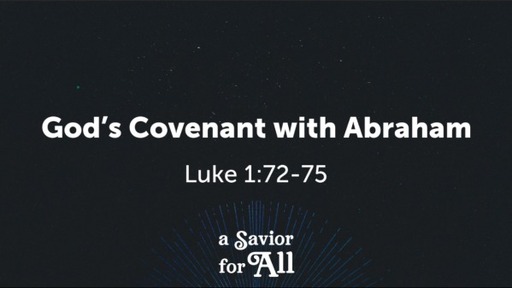God’s Covenant with Abraham

1/ Why did God make covenants with man? - vs. 72
Noahic Covenant
Abrahamic Covenant
Underscoring its crucial significance in the flow of redemptive history, the Abrahamic covenant is reiterated eight times in the book of Genesis (chapters 12; 13; 15; 17; 22; 26; 28, and 35).
Mosaic Covenant
In the Mosaic covenant, God promised the nation that they would be a special nation to him among the nations of the earth (Exod 19:5). He would be their God, and he would dwell among them (Exod 25:8). God had also promised Abraham that he would be a blessing to the nations, and God therefore intended for Israel to bless the nations by serving in a priestly role to them—Israel was supposed to draw the nations to God (Exod 19:6; Deut 4:5–8). God also promised blessing to the nation of Israel if it obeyed the commands of the Lord within the covenant (Deut 28:1–14). The blessing to the nation focused on both seed and land. The land and kingship promises to Abraham are applied to the nation in the Mosaic covenant. The nation will be a kingdom (19:6) which will inherit the land promised to Abraham (34:11).
The Mosaic covenant stands in continuity with the other covenants with its focus on blessing, seed, and land (cf. Gen 1:28). It stands distinct from the other covenants, however, with its focus on God’s law. Beginning with the Ten Commandments, God gives the people numerous laws in the overall Mosaic covenant. This is partly due to its function as a national covenant. It deals with the kinds of legal issues that all nations must deal with. But much of the instruction—such as that dealing with the tabernacle and sacrificial system—served as symbols that pointed toward greater fulfillment in Christ.
Davidic Covenant
New Covenant
2/ What promises did God make to Abraham? - vs. 73
The Blessing
Unconditional
3/ How will God fulfill his Covenant with Abraham? - vs. 74-75
He gave him a Son - Isaac
He made him a great Nation - Israel
He sent a Savior for all Mankind - Jesus
Believing Gentiles and Jews retain their ethnic identities, but both are united to Abraham through faith and are identified as descendants of Abraham (see Gal. 3:29). The Abrahamic covenant, therefore, affirms that all kinds of people will be saved by grace through faith like Abraham but that Jews and Gentiles will retain their ethnic identities within the people of God.
He will give him the land - in the Millennial Kingdom
Premillennialism insists that all the provisions of the Abrahamic Covenant must be fulfilled since the covenant was made without conditions. Much of the covenant has already been fulfilled and fulfilled literally; therefore, what remains to be fulfilled will also be fulfilled literally. This brings the focus on the yet-unfulfilled land promise. Though the nation Israel occupied part of the territory promised in the covenant, she has never yet occupied all of it and certainly not eternally as the covenant promised. Therefore, there must be a time in the future when Israel will do so, and for the premillennialist this will be in the coming millennial kingdom. Thus the Abrahamic Covenant gives strong support for premillennial eschatology.
